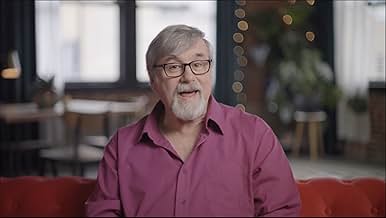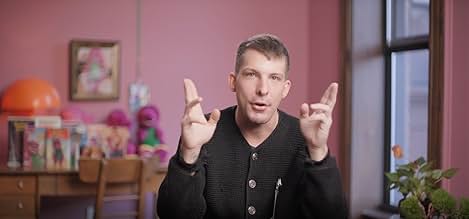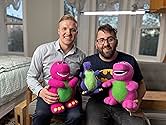Adicionar um enredo no seu idiomaFollow Barney the Dinosaur's furious reaction and what he says about the human need to hate. Something in American society was broken and never came back, or is it just who we were all along... Ler tudoFollow Barney the Dinosaur's furious reaction and what he says about the human need to hate. Something in American society was broken and never came back, or is it just who we were all along?Follow Barney the Dinosaur's furious reaction and what he says about the human need to hate. Something in American society was broken and never came back, or is it just who we were all along?
Explorar episódios
Avaliações em destaque
Over the course of two hour long episodes, I Love You, You Hate Me covers the origins of Barney the Dinosaur by Texas Schoolteacher and mother Sheryl Leach who created the character for her then 2-year-old son Patrick which through word of mouth became a massive sensation on home video before being picked up for a TV series on public television leading to an expanded media franchise. However with the rising popularity of Barney comes an equal and opposite rise in fashionable hatred of the purple dinosaur leading to emotional and mental stress, death threats from random emails directing at stars and staff, and even tragedy within the Leach family.
I Love You, You Hate Me is a two part documentary covering Barney the Dinosaur produced by Queer Eye producers Scout Productions for NBC-Universal's Peacock streaming service. Using a mixture of archival footage and interviews from those directly associated with the show as well as children's TV contemporaries like Blue Clue's Steve Burns or Bill Nye (The Science Guy) as well as former prominent "Barney Haters", the series attempts to understand why the Barney series spurred so much ire and what legacy has been left behind by it. While the show doesn't get to over everything you wish it had, it's a very well-done analysis of the Barney phenomenon from positive, negative, and in-between giving you the fullest possible view of the phenomenon and its legacy.
The show is really well-structured as we begin with Barney's origins from Texas schoolteacher and mother Sheryl Leach's desire to find something to occupy a rambunctious 2-year-old boy with her discovery of a VHS copy of Wee Sing Together and a traveling dinosaur exhibit serving as the impetus for what would become the foundations of the big purple dinosaur. The tracing of Barney's humble direct-to-video origins spread through crowd sourced marketing of moms at daycares and preschools is fascinating in its portrayal of humble origins to marketing and merchandising juggernaut and you get why the series became as ingrained with small children as it did. We also meet up with various crew involved with the show including Barney's voice actor from 1988-2000 Bob West, Barney Body actor David Joyner who provided movements for the character from 1990-2000 and gets to address misconceptions about him such as his practices of Tantra, and musical director Bob Singleton who provided the songs for the series including the theme song "I Love You, You Love Me".
While the show would be perfectly fine if nothing extraordinary if it had focused solely on the surprise runaway success of the big purple dinosaur, the show eventually finds a festering rot beneath the soft, squishy purple exterior of the franchise as it puts the culture of hate and vitriol the series inspired under a microscope and looks at the personal and societal costs of this culture of hate and what its legacy has been. Talking with notable "barney bashers" such as the founder of The I Hate Barney Secret Society, founder of pen and paper RPG The Jihad to Destroy Barney the Dinosaur, or Ted Giannoulas who appears in character as his sports mascot character The San Diego Chicken who once incorporated a Barney lookalike into his act as well as talking with former cast members and crew affected by the show we get a comprehensive look at both sides of the fence of the Barney phenomenon with the haters balanced against the hated. As Barney aired around the advent of the internet the show does make connections between the recreation of hatred directed at Barney the Dinosaur to the here and now of the digital age where internet dogpiling of memeing, populist pandering nitwits on Twitter and Youtube, and the barrage of nonsense from Twitter and QAnon has lineage that can be traced to Barney the Dinosaur complete with very similar conspiracy theories to the Q "movement" often spouting the exact same talking points you hear today. It's really intelligently done in terms of the discussion, and you do see a lot of DNA that can be traced back from the internet today to the internet of then.
My criticisms are fairly minor, but they should be addressed. Both Sheryl Leach and her son Patrick declined to be interviewed for this series and while I understand their resistance due to the subject matter involved, it does leave a hole in the story that the filmmakers do try to fill in but you can only do so much when key figures want nothing to do with this story. I also feel like the series sidesteps some of the legitimate criticism Barney the Dinosaur received from educators and child psychologists in regards to the actual content of the show itself and is instead focused primarily on the "Barney haters" who did it as a form of recreation with Bill Nye and Steve Burns making solid enough points but their segments while good could've benefitted from having a children's personality or child psychologist who didn't like Barney the Dinosaur on the value of its education merits to serve as a counterpoint.
I Love You, You Hate Me is a must watch as it's an excellent look at the internet's ability and usage in building a culture dedicated to hatred of something serving as a funhouse mirror exaggeration that only becomes louder and more distorted through our cultural lens as it's amplified and echoed into a poisonous cacophony. While I would've like to see some key individuals or other professional interviewed to give a more complete picture, the show not only gives us a definitive look at Barney the Dinosaur, but the absurdity and ugliness of the hatred he inspired.
I Love You, You Hate Me is a two part documentary covering Barney the Dinosaur produced by Queer Eye producers Scout Productions for NBC-Universal's Peacock streaming service. Using a mixture of archival footage and interviews from those directly associated with the show as well as children's TV contemporaries like Blue Clue's Steve Burns or Bill Nye (The Science Guy) as well as former prominent "Barney Haters", the series attempts to understand why the Barney series spurred so much ire and what legacy has been left behind by it. While the show doesn't get to over everything you wish it had, it's a very well-done analysis of the Barney phenomenon from positive, negative, and in-between giving you the fullest possible view of the phenomenon and its legacy.
The show is really well-structured as we begin with Barney's origins from Texas schoolteacher and mother Sheryl Leach's desire to find something to occupy a rambunctious 2-year-old boy with her discovery of a VHS copy of Wee Sing Together and a traveling dinosaur exhibit serving as the impetus for what would become the foundations of the big purple dinosaur. The tracing of Barney's humble direct-to-video origins spread through crowd sourced marketing of moms at daycares and preschools is fascinating in its portrayal of humble origins to marketing and merchandising juggernaut and you get why the series became as ingrained with small children as it did. We also meet up with various crew involved with the show including Barney's voice actor from 1988-2000 Bob West, Barney Body actor David Joyner who provided movements for the character from 1990-2000 and gets to address misconceptions about him such as his practices of Tantra, and musical director Bob Singleton who provided the songs for the series including the theme song "I Love You, You Love Me".
While the show would be perfectly fine if nothing extraordinary if it had focused solely on the surprise runaway success of the big purple dinosaur, the show eventually finds a festering rot beneath the soft, squishy purple exterior of the franchise as it puts the culture of hate and vitriol the series inspired under a microscope and looks at the personal and societal costs of this culture of hate and what its legacy has been. Talking with notable "barney bashers" such as the founder of The I Hate Barney Secret Society, founder of pen and paper RPG The Jihad to Destroy Barney the Dinosaur, or Ted Giannoulas who appears in character as his sports mascot character The San Diego Chicken who once incorporated a Barney lookalike into his act as well as talking with former cast members and crew affected by the show we get a comprehensive look at both sides of the fence of the Barney phenomenon with the haters balanced against the hated. As Barney aired around the advent of the internet the show does make connections between the recreation of hatred directed at Barney the Dinosaur to the here and now of the digital age where internet dogpiling of memeing, populist pandering nitwits on Twitter and Youtube, and the barrage of nonsense from Twitter and QAnon has lineage that can be traced to Barney the Dinosaur complete with very similar conspiracy theories to the Q "movement" often spouting the exact same talking points you hear today. It's really intelligently done in terms of the discussion, and you do see a lot of DNA that can be traced back from the internet today to the internet of then.
My criticisms are fairly minor, but they should be addressed. Both Sheryl Leach and her son Patrick declined to be interviewed for this series and while I understand their resistance due to the subject matter involved, it does leave a hole in the story that the filmmakers do try to fill in but you can only do so much when key figures want nothing to do with this story. I also feel like the series sidesteps some of the legitimate criticism Barney the Dinosaur received from educators and child psychologists in regards to the actual content of the show itself and is instead focused primarily on the "Barney haters" who did it as a form of recreation with Bill Nye and Steve Burns making solid enough points but their segments while good could've benefitted from having a children's personality or child psychologist who didn't like Barney the Dinosaur on the value of its education merits to serve as a counterpoint.
I Love You, You Hate Me is a must watch as it's an excellent look at the internet's ability and usage in building a culture dedicated to hatred of something serving as a funhouse mirror exaggeration that only becomes louder and more distorted through our cultural lens as it's amplified and echoed into a poisonous cacophony. While I would've like to see some key individuals or other professional interviewed to give a more complete picture, the show not only gives us a definitive look at Barney the Dinosaur, but the absurdity and ugliness of the hatred he inspired.
Having grown up watching and loving Barney, I was completely unaware of the negative reactions. I was also unaware of the group that hated Barney. Great video with interviews and the cast. Recommend it, highly. I think this is something that should be watched by anyone who knows Barney, no matter how they feel about him. Seeing both sides really opened my eyes and deepened my love for Barney at the same time. I only wish that this had been made sooner. It was interesting (and sad) to see what happened to the family that created Barney. Nonetheless, this is a documentary I'll be watching again quite a few times.
Going into this, I thought it would be just an interesting dive into the origins of Barney and the armies of annoyed grown-ups which resulted. What this truly is is an examination of the hearts of people and how the worst of us find reasons to hate and trample things we don't understand. Adults fostered an unnecessary hatred for a fictional entity when no one ever forced them to turn the channel and watch Barney. I was entering high school when I first heard of Barney so it didn't appeal to me. Even though I found it a bit annoying, I knew I all I had to do was not watch it. I had the same attitude toward Harry Potter. I wasn't militantly against kids reading stories about witchcraft but it just did not appeal to me.
This mini-series highlights the bad attitudes grown people had towards Barney as well as the urban legends that went with them. Barney taught children many important things in life such as love, caring, and unselfishness and this doc reminds us that something so pure can make people look for hidden evil even if it isn't there. The most gripping point of this documentary is when Steven from Blues Clues looks at the camera and asks "Who was your Barney?" Many of us had a Barney growing up whether or not it was Barney himself. I pity those who didn't.
This mini-series highlights the bad attitudes grown people had towards Barney as well as the urban legends that went with them. Barney taught children many important things in life such as love, caring, and unselfishness and this doc reminds us that something so pure can make people look for hidden evil even if it isn't there. The most gripping point of this documentary is when Steven from Blues Clues looks at the camera and asks "Who was your Barney?" Many of us had a Barney growing up whether or not it was Barney himself. I pity those who didn't.
Upon viewing the first episode , I found my self in tears. Being born in 1999, Barney was the show that I was stuck to as early as I can remember . The guest speakers were a very pleasant surprise and added great composition to the series. I do however wish that the series could have been longer and included more flashback from the series and behind the scenes intel. Also, the series could have touched on the role that early YouTube played into this barney hating phenomenon. This series was created exactly for its targeted audience and succeeded in the raw feelings of nostalgia and childhood!!
I grew up watching Barney as a kid and even then I was aware that it was corny, cheesy, unrealistic and not representative of my home life at all. In fact that's why I liked it. It was an escape for me and other kids. Although I did resent Barney for giving my parents the idea to force me and my sister to hug and sing the "I love you" song whenever we fought. Honestly though, looking back on that show as an adult, it was just an innocent cheerful children's show. I overheard older kids making fun of it but outside of that I had no idea all this Barney hatred was happening in the world. It's really sad, though at times also pretty funny. I understand the cynicism, but how was Barney any worse than Beavis and Butt-Head, Ren & Stimpy, or Rocko's Modern Life? I would argue those shows were all equally important because they all served their purpose of escapism while teaching compassion, humility, honesty, empathy and comedy. Children don't learn those things as often as they should from their own lives and unfortunately spend far too much time being in front of a screen in the first place. Barney didn't deserve the hate and it's really heartbreaking to hear how it damaged the lives of the creator and people around her. It's hard to imagine the same thing happening with any other character other than the teletubbies. It's still fun to hate on them, right? Hm.
Você sabia?
- ConexõesFeatured in AniMat's Crazy Cartoon Cast: My Father's Purple Dragon (2022)
Principais escolhas
Faça login para avaliar e ver a lista de recomendações personalizadas
Detalhes
- Cor
Contribua para esta página
Sugerir uma alteração ou adicionar conteúdo ausente

Principal brecha
What is the Spanish language plot outline for I Love You, You Hate Me (2022)?
Responda


























